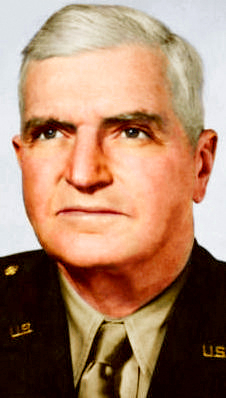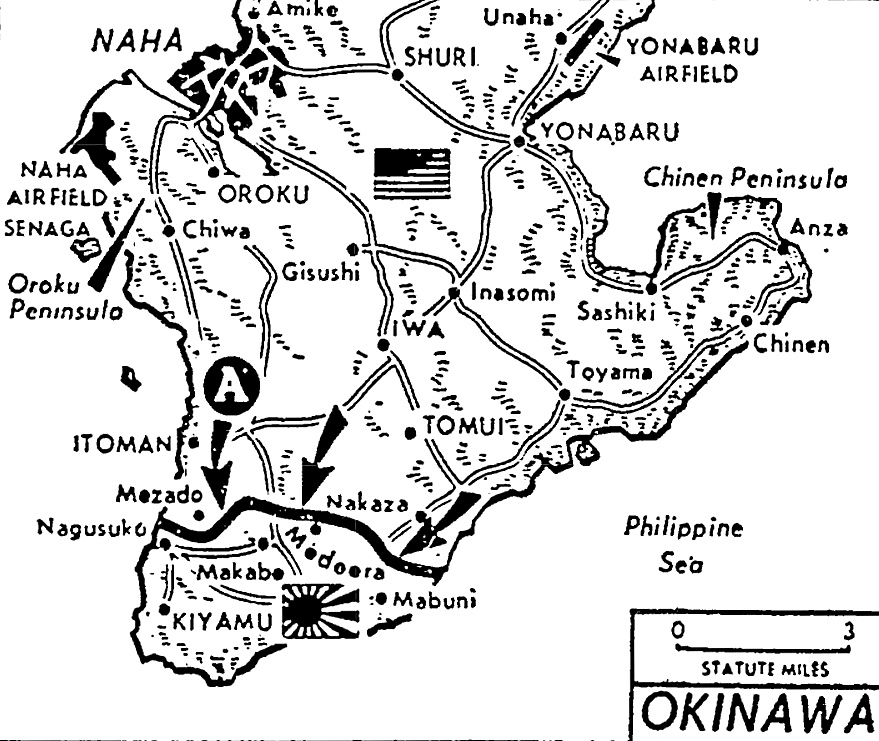Youngstown Vindicator (June 20, 1945)
BUCKNER DIES LEADING OKINAWA DRIVE
Tenth Army chief killed by Jap shell
Missile bursts on rock from which leader guides battle
By Al Dopking, Associated Press staff writer

U.S. TENTH ARMY HQ, Okinawa – Lt. Gen. Simon Bolivar Buckner Jr., who had predicted that “with any kind of luck” the fierce Okinawa campaign would end this week, was killed Monday by a Japanese shell almost at the moment of final victory by his Tenth Army.
The sturdy, silver-haired Kentuckian, who at 58 had won a reputation for aggressiveness and discipline, was the second three-star general to die by enemy action in this war and was the 22nd general officer killed or missing in action against Germany and Japan. Lt. Gen. Lesley J. McNair was killed on the Normandy front.
Death came at a forward observation post as Buckner watched the Marine 8th Regimental Combat Team – newly-arrived on Okinawa – plunge southward against the retreating Japanese in a climactic assault on the southern tip of the island.
The first Japanese shell to strike that vicinity all day burst at 1:15 p.m. directly on a rock where he was seated. A large fragment of steel or coral pierced his left chest.
Several more shells struck the position, so that Marine officers had to carry Buckner to shelter behind a cliff before first aid and plasma could be administered. At 1:25 p.m., 10 minutes after he was hit, Gen. Buckner died.
Command of the Tenth Army and of the ground forces in the Ryukyus devolved immediately upon Maj. Gen. Roy S. Geiger, commander of the Marine III Amphibious Corps, a part of the Tenth Army. Geiger was recently nominated for lieutenant general.
Arrows locate major U.S. drives against the Japs pocketed in Okinawa’s southern tip with (A) indicating the Marine advance being observed by Lt. Gen. Simon Bolivar Buckner, commander of the Tenth Army, when he met his death.
Nimitz reveals death
Adm. Chester W. Nimitz, overall commander of the operations, formally announced Buckner’s death and issued this message to the forces under his command:
Although we join in grieving over the loss of your able and courageous leader, Lt. Gen. Buckner, all of us in the Pacific Ocean Areas take pride in the day of victory on which he gallantly met a soldier’s death.
By the achievements of the Tenth Army in the Okinawa campaign under his leadership, we will all gain new inspiration to overcome any and all obstacles standing between us and final victory over Japan.
Nimitz did not elaborate on his reference to “the day of victory,” but Vice Adm. Harry Hill, in a message of condolence, also referred to Buckner’s “untimely death in the hour of victory.”
Others express regrets
Expressions of regret were also made by Secretary of War Henry L. Stimson and Secretary of the Navy James Forrestal and by Adm. Ernest King.
Only the day before Buckner’s death, Adm. Nimitz had stoutly defended Buckner’s Okinawa operations against criticism by newspaper columnist David Lawrence.
Calling an unprecedented press conference at Guam, Nimitz had declared his faith in Buckner’s tactical decisions and highly praised the Tenth Army leader. He asserted that criticism of the slowness of the campaign and of failure to land behind enemy lines was due to the columnist being “misinformed.” Nimitz said a plan to land behind the enemy’s Shuri Line already had been investigated and found impracticable and dangerous.
Funeral services for the general were held at 9 a.m. today at a 7th Infantry Division cemetery near Hagushi beach. A bugle sounded taps as the simple wooden coffin was lowered into the grave, and an honor guard fired a last salute. The Stars and Stripes whipped in the breeze overhead alongside Buckner’s three-star personal flag.
Father in Civil War
Thus ended the career of the second American lieutenant general to bear the name of Simon Bolivar Buckner.
The first was his father, who was forced to surrender Fort Donelson to Gen. U. S. Grant early in the Civil War, but who was exchanged and rose to a lieutenant general before that war ended. Later he was governor of Kentucky, where Simon Jr. was born near Munfordville July 18, 1886.
Young Buckner attended Virginia Military Institute and then the U.S. Military Academy at West Point, where he graduated in 1908. He served two tours of duty in the Philippines, was an early student of aviation. and twice was an instructor at West Point, where he later was commandant, from 1933 to 1936.
Known in the service as a stern but fair disciplinarian and as a rugged and enthusiastic outdoorsman and hunter, Buckner nevertheless was far from being a public figure when, as a colonel, he was sent to Alaska in 1939. He was promoted to brigadier general that same year, and became a major general August 4, 1941.
Advisor in Aleutians campaign
Buckner was an advisor in the Aleutians campaign that followed, although he did not participate physically, a fact that he vocally regretted.
He was promoted to lieutenant general May 4, 1933. and a year later was relieved of command of the Alaskan department and dropped out of sight. Although it was not known to the public, he actually was being given the chance he yearned for – action as a field commander.
Oa April 1, 1945, the new Tenth Army, made up of Army and Marine divisions, invaded the Ryukyus, with Buckner as commanding general.
In the long and bloody campaign that followed, he was frequently at the front, checking positions, observing, advising – and exposing himself to risks such as brought his death in action.
The general is survived by his widow, the former Adele Blanc, whom he married in 1916, and by two sons and a daughter.
Simon Bolivar Buckner III is a captain in the Signal Corps in Europe; William Claiborne Buckner is a West Point cadet, and May Buckner, a Red Cross worker in San Francisco, where Mrs. Buckner also resides.
